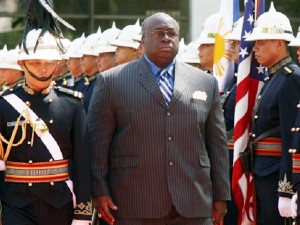For US Ambassador Harry Thomas Jr., there are at least six reasons why he is optimistic about the Philippines.
Speaking before the American Chamber of Commerce, Thomas last week noted the following: “First, President Aquino’s campaign pledge to root out corruption is beginning to take hold though public disclosure of past violations, new leadership in oversight institutions, increased public antagonism to cronyism, and through nascent initiatives that if implemented effectively offer the opportunity for gradual but effective change.”
“Second, the economy continues to prosper, showing a resilience many nations could envy. Third, international assessment of the Philippines macroeconomic policies continues to be favorable. Fourth, Philippine success in global labor markets has continued. Fifth, the spectrum of Philippine security agencies are increasingly effective in conducting credible law enforcement although there is still a vast gap in the resources needed,” the envoy also said.
Caliber of leadership
And lastly, Thomas said he was “heartened by the caliber of leadership I see across the key Cabinet agencies—Secretary (Leila) de Lima in justice, Secretary (Gregory) Domingo in trade, and Secretary (Cesar) Purisima in finance, to name a few.”
Thomas, however, said he was not glossing over the tough issues.
“Trust me, I am not. The fight against corruption may be more powerful than ever, but it is still a David to the Goliath of entrenched interests seeking to block competition, protect vested interests and disrupt the course of justice,” he pointed out.
Economic growth “has not bridged the poverty gap. While international assessment of Philippine macroeconomic policies is favorable, the country still lags behind most other Association of Southeast Asian neighbors in key areas. That has to change.”
“The flip side of Philippine success in global labor markets represents separated families, the loss of significant national talent and the risk of remittance dependency. And while Philippine security agencies may be improving, the continuing insurgencies and the level of crime still stand as serious challenges,” said Thomas.
But the US diplomat said he remains optimistic “because Filipinos are optimistic.”
“Because they believe, as they haven’t in a while, that positive change can come. Because the leadership is prepared to take hard decisions, because the business community is prepared to invest, because the worker is prepared to make the extra effort to see this country succeed,” said Thomas.
Lots remain to be done
He believes “hope isn’t tangible, but look around and you’ll see hope manifests in building projects, energy infrastructure investments, expanded manufacturing plants, and in bottom lines that are looking up.”
“Lots remain to be done, but we see a commitment to start doing it, whether it’s criminal reforms or tax collection,” said Thomas.
Washington, he said, is “excited about the prospects for facilitating real changes” in the Philippines.
Thomas assured “US aid will continue through the Partnership for Growth (program), its impressive efforts to open doors for businesses, including franchises, as well as addressing some of the fundamental tools for growth, like health and education.”
“This year, the US Agency for International Development and Peace Corps celebrate 50 years of cooperation with the Philippines by looking forward to new initiatives and new engagements,” he said.
The US-run Millennium Challenge Corporation “will soon start implementing its $434-million program to build infrastructure, support community-led development and enhance government revenue collection,” he announced.
“This is a substantial augmentation of our investment in the Philippines, and I think you will be very impressed by its impact,” Thomas said, adding “this is a time of opportunity, of renewed attention from the US towards this region, and that is reason for us all to see sunny days ahead.”


